I have an application that I've recently had to add a mixed platform (some 32-bit some 64-bit) component to. For the 64-bit build, one .exe is 32-bit, the rest are 64-bit, and all the DLLs are set to "Any CPU" (because they need to be shared between both platforms). Everything works just fine when I compile in Debug. The 64-bit applications works, the 32-bit application works, and they share all the DLLs no problem. When I change to Release mode I get a System.BadImageFormatException when trying to start the 64-bit application (note the 32-bit component runs fine). The error is as follows:
System.BadImageFormatException was unhandled
FileName=XXXXXXXXX.Framework, Version=1.0.0.0, Culture=neutral, PublicKeyToken=null
FusionLog==== Pre-bind state information ===
LOG: DisplayName = XXXXXXXXX.Framework, Version=1.0.0.0, Culture=neutral, PublicKeyToken=null
(Fully-specified)
LOG: Appbase = file:///D:/company/branches/product/2.6/product/product/bin/Release/x64/
LOG: Initial PrivatePath = NULL
Calling assembly : product, Version=2.0.0.0, Culture=neutral, PublicKeyToken=null.
===
LOG: This bind starts in default load context.
LOG: Using application configuration file: D:\company\branches\product\2.6\product\product\bin\Release\x64\product.vshost.exe.Config
LOG: Using host configuration file:
LOG: Using machine configuration file from C:\Windows\Microsoft.NET\Framework64\v4.0.30319\config\machine.config.
LOG: Policy not being applied to reference at this time (private, custom, partial, or location-based assembly bind).
LOG: Attempting download of new URL file:///D:/company/branches/product/2.6/product/product/bin/Release/x64/XXXXXXXXX.Framework.DLL.
ERR: Failed to complete setup of assembly (hr = 0x8007000b). Probing terminated.
HResult=-2147024885
Message=Could not load file or assembly 'XXXXXXXXX.Framework, Version=1.0.0.0, Culture=neutral, PublicKeyToken=null' or one of its dependencies. An attempt was made to load a program with an incorrect format.
Source=product
StackTrace:
at product.App.OnStartup(StartupEventArgs e)
at System.Windows.Application.<.ctor>b__1_0(Object unused)
at System.Windows.Threading.ExceptionWrapper.InternalRealCall(Delegate callback, Object args, Int32 numArgs)
at System.Windows.Threading.ExceptionWrapper.TryCatchWhen(Object source, Delegate callback, Object args, Int32 numArgs, Delegate catchHandler)
at System.Windows.Threading.DispatcherOperation.InvokeImpl()
at System.Threading.ExecutionContext.RunInternal(ExecutionContext executionContext, ContextCallback callback, Object state, Boolean preserveSyncCtx)
at System.Threading.ExecutionContext.Run(ExecutionContext executionContext, ContextCallback callback, Object state, Boolean preserveSyncCtx)
at System.Threading.ExecutionContext.Run(ExecutionContext executionContext, ContextCallback callback, Object state)
at MS.Internal.CulturePreservingExecutionContext.Run(CulturePreservingExecutionContext executionContext, ContextCallback callback, Object state)
at System.Windows.Threading.DispatcherOperation.Invoke()
at System.Windows.Threading.Dispatcher.ProcessQueue()
at System.Windows.Threading.Dispatcher.WndProcHook(IntPtr hwnd, Int32 msg, IntPtr wParam, IntPtr lParam, Boolean& handled)
at MS.Win32.HwndWrapper.WndProc(IntPtr hwnd, Int32 msg, IntPtr wParam, IntPtr lParam, Boolean& handled)
at MS.Win32.HwndSubclass.DispatcherCallbackOperation(Object o)
at System.Windows.Threading.ExceptionWrapper.InternalRealCall(Delegate callback, Object args, Int32 numArgs)
at System.Windows.Threading.ExceptionWrapper.TryCatchWhen(Object source, Delegate callback, Object args, Int32 numArgs, Delegate catchHandler)
at System.Windows.Threading.Dispatcher.LegacyInvokeImpl(DispatcherPriority priority, TimeSpan timeout, Delegate method, Object args, Int32 numArgs)
at MS.Win32.HwndSubclass.SubclassWndProc(IntPtr hwnd, Int32 msg, IntPtr wParam, IntPtr lParam)
at MS.Win32.UnsafeNativeMethods.DispatchMessage(MSG& msg)
at System.Windows.Threading.Dispatcher.PushFrameImpl(DispatcherFrame frame)
at System.Windows.Application.RunDispatcher(Object ignore)
at System.Windows.Application.RunInternal(Window window)
at product.App.Main() in D:\company\branches\product\2.6\product\product\obj\x64\Release\App.g.cs:line 51
at System.AppDomain._nExecuteAssembly(RuntimeAssembly assembly, String[] args)
at System.AppDomain.ExecuteAssembly(String assemblyFile, Evidence assemblySecurity, String[] args)
at Microsoft.VisualStudio.HostingProcess.HostProc.RunUsersAssembly()
at System.Threading.ExecutionContext.RunInternal(ExecutionContext executionContext, ContextCallback callback, Object state, Boolean preserveSyncCtx)
at System.Threading.ExecutionContext.Run(ExecutionContext executionContext, ContextCallback callback, Object state, Boolean preserveSyncCtx)
at System.Threading.ExecutionContext.Run(ExecutionContext executionContext, ContextCallback callback, Object state)
at System.Threading.ThreadHelper.ThreadStart()
InnerException:
Now, when I compare the configurations in the Configuration Manager, they are identical except for the fact that one is Release and the other is Debug.
Debug build configuration:
Release build configuration:
All the rest of the projects farther down the list are dlls and are set to "Any CPU" in both configurations. Why the heck doesn't this work in release? It just doesn't make any sense. I'm almost tempted to release the Debug version since it works exactly the way I want it to. I've checked the following stack questions for my answer, but they are just slightly different. Plus, I don't have the option of being able to just build in only 32-bit. I require both platforms, but the 64-bit fails for some reason.

